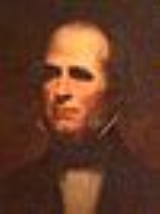
Emory Washburn
Encyclopedia
Emory Washburn was a United States political figure. Born in 1800 in Leicester, Massachusetts
, Washburn was the 22nd Governor of Massachusetts
from 1854 to 1855. He was elected as a member of the United States Whig Party defeating Henry W. Bishop
(Democrat) and Henry Wilson
(Free Soil
) with 46% of the vote. A majority requirement being in effect, he became the last governor elected by the state senate in this fashion; as well as the last Whig. In his attempt at re-election in November 1854, he fell victim to the Know Nothing
wave in Massachusetts and was soundly trounced by the Know Nothing candidate, former Websterite Whig Henry J. Gardner
, receiving only 21% of the vote.
Along with distant cousin Ichabod Washburn
, he helped found Worcester Polytechnic Institute
. He died in 1877 aged 77 in Cambridge, Massachusetts
and was buried at Mount Auburn Cemetery
.
Leicester, Massachusetts
Leicester is a town in Worcester County, Massachusetts, United States. The population was 10,970 at the 2010 census.-History:Leicester was first settled in 1713 and was officially incorporated in 1714....
, Washburn was the 22nd Governor of Massachusetts
Governor of Massachusetts
The Governor of the Commonwealth of Massachusetts is the executive magistrate of the Commonwealth of Massachusetts, United States. The current governor is Democrat Deval Patrick.-Constitutional role:...
from 1854 to 1855. He was elected as a member of the United States Whig Party defeating Henry W. Bishop
Henry W. Bishop
Henry W. Bishop was a leading citizen of Chicago, Illinois in the late 19th century. He was the first president of the Union Club of Chicago, a private association organized by sixty of the city's leading gentlemen. His tenure lasted from 1878 to 1883...
(Democrat) and Henry Wilson
Henry Wilson
Henry Wilson was the 18th Vice President of the United States and a Senator from Massachusetts...
(Free Soil
Free Soil Party
The Free Soil Party was a short-lived political party in the United States active in the 1848 and 1852 presidential elections, and in some state elections. It was a third party and a single-issue party that largely appealed to and drew its greatest strength from New York State. The party leadership...
) with 46% of the vote. A majority requirement being in effect, he became the last governor elected by the state senate in this fashion; as well as the last Whig. In his attempt at re-election in November 1854, he fell victim to the Know Nothing
Know Nothing
The Know Nothing was a movement by the nativist American political faction of the 1840s and 1850s. It was empowered by popular fears that the country was being overwhelmed by German and Irish Catholic immigrants, who were often regarded as hostile to Anglo-Saxon Protestant values and controlled by...
wave in Massachusetts and was soundly trounced by the Know Nothing candidate, former Websterite Whig Henry J. Gardner
Henry J. Gardner
Henry Joseph Gardner was the 23rd Governor of Massachusetts from 1855–1858. Gardner was the candidate of the Know-Nothing movement, and was elected governor as part of the sweeping victory of Know-Nothing candidates in the Massachusetts elections of 1854.-Early life:Henry Gardner was born...
, receiving only 21% of the vote.
Along with distant cousin Ichabod Washburn
Ichabod Washburn
Ichabod Washburn was a church deacon and industrialist from Worcester County, Massachusetts, USA. His financial endowments led to the naming of Washburn University in Topeka, Kansas and the foundation of Worcester Polytechnic Institute in Worcester, Massachusetts.Washburn became an apprentice in...
, he helped found Worcester Polytechnic Institute
Worcester Polytechnic Institute
Worcester Polytechnic Institute is a private university located in Worcester, Massachusetts, in the United States.Founded in 1865 in Worcester, WPI was one of the United States' first engineering and technology universities...
. He died in 1877 aged 77 in Cambridge, Massachusetts
Cambridge, Massachusetts
Cambridge is a city in Middlesex County, Massachusetts, United States, in the Greater Boston area. It was named in honor of the University of Cambridge in England, an important center of the Puritan theology embraced by the town's founders. Cambridge is home to two of the world's most prominent...
and was buried at Mount Auburn Cemetery
Mount Auburn Cemetery
Mount Auburn Cemetery was founded in 1831 as "America's first garden cemetery", or the first "rural cemetery", with classical monuments set in a rolling landscaped terrain...
.

